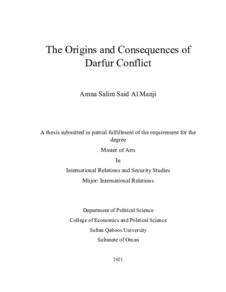Document
The Origins and consequences of Darfur conflict.
Identifier
Al-Manjiyah, Amna Salim Said (2021). The Origins and consequences of Darfur conflict (Master thesis, Sultan Qaboos University, Muscat, Oman).
Publisher
Sultan Qaboos University.
Gregorian
2021
Language
English
Subject
English abstract
The conflict erupted in Darfur in 2003 when two domestic rebel groups launched an attack
against National Islamic Front in Darfur. The two opposing groups representing in Sudan
were the Sudan Liberation Army and the Justice and Equality Movement . About 400
thousand people have died in the conflict, and a further 2 to 3 million have become
refugees or internally displaced persons because of the warfare. The political history of
Sudan is a history of uprisings and civil wars, superimposed on each other and rooted deep
into the legacy of the colonial rule policies. The British administration entrenched the
rhetoric of race and politicised racial identification in Sudan. It manipulated tribalism and
imposed a political hierarchy between the tribes of Darfur. The British rule transformed
"the Arab and the Africans from flexible cultural identities to rigid political identities". It
intended to separate Arab from non-Arab and establish order. The British administration
followed the policy of economic inequality between the central Sudan Arabs and peripheral
Sudan. It concentrated the development and economic activities in one part of the country,
the northern part but neglected the peripheral part notably the south and Darfur. The
northern region enjoyed a privileged status as they were given access to education and
power, while the colonial administration introduced Closed Districts Ordinance for Darfur
and South. After independence and in the mid-eighties particularly, Darfur suffered from
severe drought, causing a conflict between the Arab pastoralists and the African
agriculturalist groups. Due to the deteriorating economic situation, the government could
do nothing to help them. The economy of Sudan deteriorated due to the legacy of British
colonialism notably the problem in the south, the government's rigid foreign policy, weak
state institutions and economic embargo. All these factors depleted the state's financial
resources and deprived the state, especially the periphery from development. The conflict
system was facilitated by many factors such as power vacuums in hinterlands, the presence
of trans-border ethnic groups because of colonialisms' arbitrary division, the flow of
weapons through Chad wars and Chad-Libya war and external intervention.
Member of
Resource URL
Arabic abstract
اندلعت الأزمة في دارفور عام 2003 عندما ظهرت جماعتان متمردتان محليتان لتحدي الجبهة القومية الإسلامية في دارفور. الجماعتان المعارضتان تتمثلان في جيش تحرير السودان وحركة العدل والمساواة. لا يزال الصراع مستمراً وبأعلى حدة من الأعمال العدائية في 2003-2006 قتل حوالي 400 ألف شخص في النزاع ، وأصبح ما بين 2 إلى. 3 ملايين آخرين لاجئين أو نازحين داخلًيا نتيجة الحرب. التاريخ السياسي للسودان هو تاريخ من الانتفاضات والحروب الأهلية ، متراكبة على بعضها البعض ومتجذرة بعمق في إرث سياسات الحكم الاستعماري . ر ّسخت الإدارة البريطانية في السودان الخطاب العنصري وعملت على تسييس الهوية العرقية. في دارفور أدخل الاستعمار البريطاني القبلية وفرض هرمية سياسية بين قبائل دارفور. حّول الحكم البريطاني "العرب والأفارقة من هويات ثقافية مرنة إلى هويات سياسية جامدة". كان ينوي فصل العربي عن غير العربي وإقامة النظام. عليه اتبعت الإدارة البريطانية سياسة عدم المساواة الاقتصادية بين عرب السودان والافارقة. حيث ركزت الأنشطة التنموية والاقتصادية في جزء واحد من البلاد ، الجزء الشمالي ، وهمشت وأهملت الأطراف ، ولا سيما الجنوب ودارفور. تمتع الشماليون بوضع متميز حيث حصلوا على التعليم والسلطة. بينما أصدرت الإدارة الاستعمارية قانون المناطق المغلقة لدارفور والجنوب. بعد الاستقلال وفي منتصف الثمانينيات ، عانت دارفور من جفاف شديد تسبب في صراع بين الرعاة العرب ومجموعات الفلاحين الأفارقة. وبسبب الوضع الاقتصادي المتدهور ، لم تستطع الحكومة فعل أي شيء لمساعدتهم. في الواقع أن اقتصاد السودان تدهور بعد الاستقلال بسبب مشاكل الإرث الاستعماري وابرزها مشكلة الجنوب وبسبب أيضا سياسة الحكومة الخارجية وضعف مؤسسات الدولة والحصار الاقتصادي ، كل هذه العوامل استنزفت موارد الدولة المالية وحرمت الدولة خاصة الأطراف من التنمية. تم تسهيل نظام الصراع من قبل العديد من العوامل وهي فراغ السلطة في المناطق النائية ، ووجود مجموعات عرقية عابرة للحدود نتيجة التقسيم التعسفي للحدود من قبل الاستعمار ، وتدفق الأسلحة عبر حروب تشاد والحرب التشادية وفقً درس هذا البحث كيفية تأثير سياسات ما بعد الاستعمار البريطانية على الليبية ، والتدخل الخارجي. ا لذلك ، سي نزاع دارفور وسيحلل إرث الاستعمار في السودان بعد الاستقلال .كما سيوضح دور التدخلات الخارجية التي أدت إلى تصعيد الصراع واستكشاف العواقب الاقتصادية والاجتماعية والسياسية لنزاع دارفور .أخيًرا ، سيدرس البحث مبادرات السلام والتحديات التي تواجه اتفاقيات السلام.
Category
Theses and Dissertations

